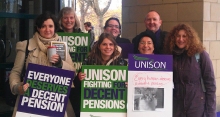Education support workers are a hidden workforce and that needs to change

I represent UNISON on the United Kingdom’s Trades Union Congress’ Education Unions Forum and its Alliance for Science.
I sit on the UK government’s Department for Education’s national Education Forum.
I also represent PSI’s European Public Services Union (EPSU) on the European Union’s Sector Social Dialogue in Education (ESSDE).
I was born in Lichfield, Staffordshire, UK and attended local schools before I went on to study geology at Kings College, University of London. My generation was the first in my family’s history to go to University; I come from a long line of farm labourers.
UNISON seconded the motion to set up PSI’s Education Support and Cultural Workers Network (ESCW). We see it as an important step in raising the global profile of a hidden workforce. In the UK when people think of schools, colleges or universities they usually only see teachers or lecturers. Yet half of the workforce in education establishments is made up of support workers, without whom schools wouldn’t get cleaned, students wouldn’t get fed, and vital administrative tasks would not get completed. The work our members do in supporting teachers in classrooms as learning mentors and pastoral care for disadvantaged students is often unseen. This needs to change and governments, employers and communities should understand and value the vital role our members play.
Because ours is a hidden workforce, we see low pay, poor terms and conditions of employment, and minimal training. Our members’ work is targeted for outsourcing and privatisation that serve to squeeze our members’ living standards and take away their jobs all in the name of efficiency, but in reality in the name of profit.
I hope that ESCW will be more than just a solidarity organisation. We need to learn from each other, share strategies and ideas; celebrate our wins and learn from our setbacks.
I would like to make a positive contribution to ESCW. UNISON has increased its membership in education, particularly in schools, in recent years. We work to improve our services to members and take action to defend our members when needed. We are also seeking to provide professional services to help workers, an example of which is our Skills for Schools website: www.skillsforschools.org.uk, our online guide to careers, training and development in schools.
I hope to be able to contribute our experiences and also learn from others on ways to improve. Ultimately we are all interested in enriching the learning and skills of students across the world. Yet, we cannot achieve this goal without a better-trained, motivated and rewarded educational workforce.

